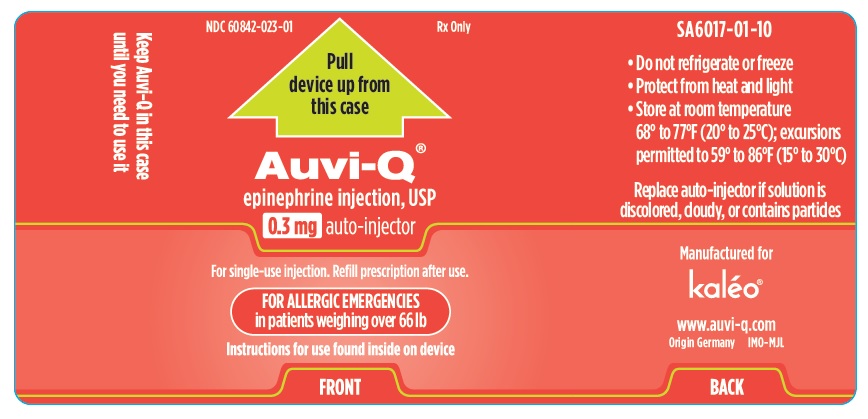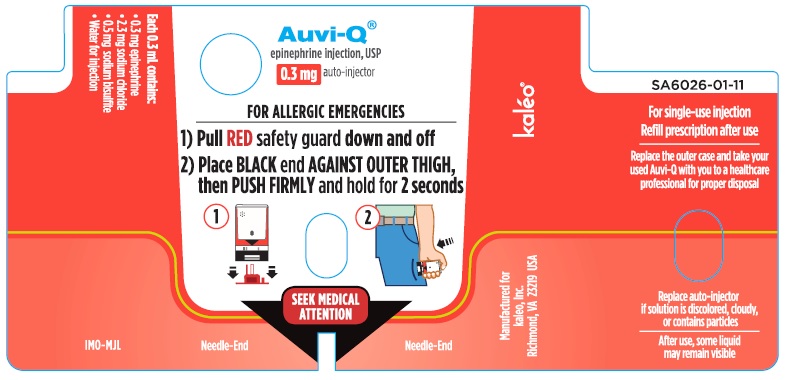Auvi-q | Epinephrine Injection while Breastfeeding

What is Auvi-q | Epinephrine Injection used for?
I am breastfeeding mother and I am using Auvi-q | Epinephrine Injection. Can it have any bad effect on my kid? Shall I search for better alternative?

8.3 NURSING MOTHERS It is not known whether epinephrine is excreted in human milk. Because many drugs are excreted in human milk, caution should be exercised when AUVI-Q is administered to a nursing woman.
Auvi-q | Epinephrine Injection Breastfeeding Analsys
Epinephrine while Breastfeeding
SafeCAS Number: 51-43-4
Used as a systemic drug for cardiac resuscitation and locally in topical anesthetic preparations, epidural anesthesia, eye drops (mydriatic), and nasal drops (vasoconstrictor). At last update no published data on excretion in breast milk were found.Its rapid metabolism (short Tmax and T½) makes it unlikely an excretion into milk in significant amounts. It is destroyed in the gastrointestinal tract. The low oral-bioavailability makes its levels into infant's plasma, that would be absorbed from ingested breast milk, be nil or negligible. Maintained high intravenous doses decrease milk production by interfering with the secretion of prolactin especially the early postpartum-weeks, because when breastfeeding is well established, prolactin levels do not correlate with milk production any longer. No problems related to lactation have been observed due to epidural anesthesia in which adrenaline is used.
Auvi-q | Epinephrine Injection Breastfeeding Analsys - 2
Epinephrine while Breastfeeding
CAS Number: 51-43-4

No information is available on the use of epinephrine during breastfeeding. Because of its poor oral bioavailability and short half-life, any epinephrine in milk is unlikely to affect the infant. High intravenous doses of epinephrine might reduce milk production or milk letdown. Low-dose intramuscular (such as Epi-Pen), epidural, topical, inhaled or ophthalmic epinephrine are unlikely to interfere with breastfeeding. To substantially diminish the effect of the drug after using eye drops, place pressure over the tear duct by the corner of the eye for 1 minute or more, then remove the excess solution with an absorbent tissue.

What should I do if I am breastfeeding mother and I am already exposed to Auvi-q | Epinephrine Injection?
It is always a good idea to keep your healthcare provider or doctor informed about your drug usage during pregnancy and breastfeeding but if you have not informed your doctor about Auvi-q | Epinephrine Injection and have used it then do not panic as Auvi-q | Epinephrine Injection is mostly safe in breastfeeding and should not cause any harm to your baby.
I am nursing mother and my doctor has suggested me to use Auvi-q | Epinephrine Injection, is it safe?
Usage of Auvi-q | Epinephrine Injection is safe for nursing mothers and baby, No worries.
If I am using Auvi-q | Epinephrine Injection, will my baby need extra monitoring?
No
Who can I talk to if I have questions about usage of Auvi-q | Epinephrine Injection in breastfeeding?
US
National Womens Health and Breastfeeding Helpline: 800-994-9662 (TDD 888-220-5446) 9 a.m. and 6 p.m. ET, Monday through Friday
UK
National Breastfeeding Helpline: 0300-100-0212 9.30am to 9.30pm, daily
Association of Breastfeeding Mothers: 0300-330-5453
La Leche League: 0345-120-2918
The Breastfeeding Network supporter line in Bengali and Sylheti: 0300-456-2421
National Childbirth Trust (NCT): 0300-330-0700
Australia
National Breastfeeding Helpline: 1800-686-268 24 hours a day, 7 days a week
Canada
Telehealth Ontario for breastfeeding: 1-866-797-0000 24 hours a day, 7 days a week
